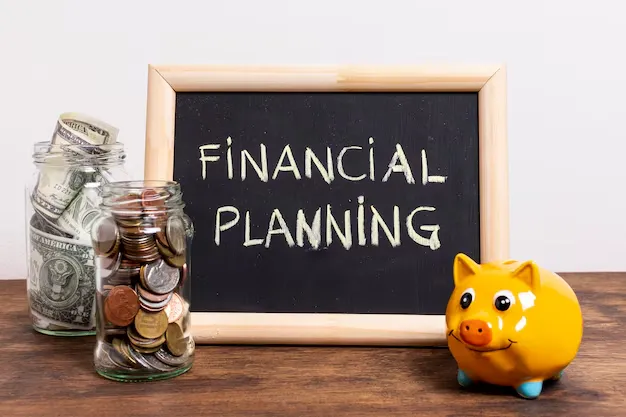Call us today!
Call us today!

Your Health & Wealth
Bodyguard
Our Latest Insights: Blog & Resources

Financial Planning for New Educators: Starting Off Right
Introduction
Starting a career in education is an exciting milestone, but it also comes with financial responsibilities that many new teachers are unprepared for. Financial planning from day one is essential to ensure long-term stability and prevent common financial pitfalls.
Many new educators face challenges such as low starting salaries, student loan debt, and limited financial literacy. Without a solid plan, they risk falling into financial traps that can take years to overcome. This guide will walk you through the essential steps to financial stability, smart saving habits, and long-term wealth-building strategies to help new teachers start off right.
Why Financial Planning is Critical from Day One
1. Building a Strong Financial Foundation
Teaching salaries may start lower than other professions, making budgeting and smart financial choices essential.
Many teachers have student loan debt, requiring a structured repayment plan.
Educators often spend out-of-pocket on classroom supplies, impacting their personal budget.
2. Common Mistakes New Teachers Make
Not creating a budget: Without a financial plan, it’s easy to overspend and accumulate debt.
Ignoring retirement savings: Many teachers delay contributing to 403(b) or pension plans, missing out on years of compound growth.
Not taking full advantage of employer benefits: Many new teachers don’t fully understand their benefits package, leading to missed financial opportunities.
Taking on too much debt: New educators sometimes overextend on lifestyle choices, leading to unnecessary financial stress.
Avoiding these mistakes sets the stage for financial success in the long run.
The First Steps to Financial Stability
1. Setting a Budget on a Teacher’s Salary
Creating a realistic budget is the foundation of financial success. A good starting point is the 50/30/20 budgeting rule:
50% of income – Essentials: Rent, utilities, groceries, transportation, insurance.
30% of income – Discretionary spending: Dining out, entertainment, hobbies.
20% of income – Savings and debt repayment: Emergency fund, retirement contributions, student loan payments.
📌 Tip: Use budgeting apps like Mint, YNAB, or EveryDollar to track expenses and stay on top of finances.
2. Understanding Employer Benefits
Many new teachers overlook valuable benefits provided by their school district. Understanding these benefits can save money and provide long-term financial security:
Retirement plans (403(b) & 457(b)): Start contributing early to benefit from employer matching and tax advantages.
Health Insurance: Choose the best plan based on coverage vs. cost to avoid overpaying.
Loan Forgiveness Programs: Public Service Loan Forgiveness (PSLF) may help eliminate student loan debt after 120 qualifying payments.
Teacher Discounts & Perks: Many companies offer discounts to educators, which can help cut costs on everyday expenses.
Smart Saving and Investing Habits
1. Emergency Funds for New Teachers
An emergency fund helps cover unexpected expenses such as car repairs, medical bills, or job-related costs. Start small and build over time:
Goal: Save at least 3-6 months’ worth of essential expenses.
Where to Keep It: Use a high-yield savings account for easy access and growth.
How to Save: Automate savings with direct deposits from each paycheck.
2. How to Start Investing with a Limited Income
Many new teachers believe investing is only for those with high salaries, but starting early—no matter how small—can have a huge impact. Here’s how to get started:
Contribute to a 403(b) or 457(b) Plan: These tax-advantaged retirement accounts allow pre-tax savings to grow over time.
Open a Roth IRA: Contributions are post-tax, but withdrawals in retirement are tax-free.
Use Micro-Investing Apps: Apps like Acorns or Stash allow teachers to invest small amounts with round-up savings from everyday purchases.
Take Advantage of Employer Matching: If your school district offers matching contributions to retirement plans, contribute at least enough to get the full match—it’s free money!
📌 Tip: Even contributing $50 per month to an investment account can lead to significant growth over 30+ years due to compound interest.
Final Thoughts
Why Early Planning Leads to Lifelong Financial Security
Starting financial planning early gives educators the ability to:
Avoid financial stress by managing debt and expenses wisely.
Take advantage of compound interest to grow long-term savings.
Retire comfortably by building multiple income streams over time.
Encouragement to Start Managing Finances Today
Every teacher, regardless of salary level, can start making smart financial choices today:
Create a budget that prioritizes savings and debt repayment.
Understand and maximize employer benefits.
Start investing, even with small amounts.
Build an emergency fund to prepare for unexpected expenses.
Explore financial literacy resources to continue learning.
📌 Taking control of finances early allows educators to achieve financial independence, reduce stress, and enjoy long-term wealth! Start today!


